Wearing her trademark blue-and-yellow eyeliner, Ukrainian high jumper Yaroslava Mahuchikh smashed a 37-year-old high jump world record earlier this week.
The world and European champion is now hoping for gold at the 2024 Paris Olympics, where she said she would be honored to represent her country’s soldiers battling Russian forces on the front lines.
“It’s only because they protect us I have the opportunity to jump,” Mahuchikh, 22, said in one of several interviews she gave to NBC News between last September and April. She added that she took inspiration from letters she’d received from some of the troops.
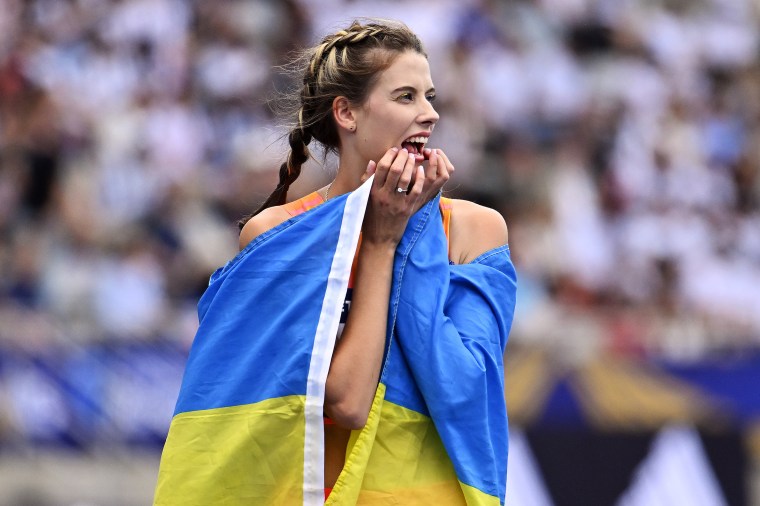
Like many of her fellow Ukrainian athletes, Mahuchikh was angry that some Russian and Belarusian athletes would be allowed to attend the Games after the International Olympic Committee cleared some of them to compete under neutral status, without a national flag or anthem.
“If you talk about the Olympic Games, it’s about peace. How can we talk about peace if Russia invades my country in the center of Europe? It’s crazy,” she said. “When I see Russian athletes, I imagine every city, every building destroyed, every life that Russia takes,” she added.
Those views were echoed by Bogdan Iadov, a judoka who, like Mahuchikh, is one of Ukraine’s medal hopes in Paris. “When the war continues, they can’t participate,” said Iadov, 27, who also gave several interviews to NBC News in recent months.
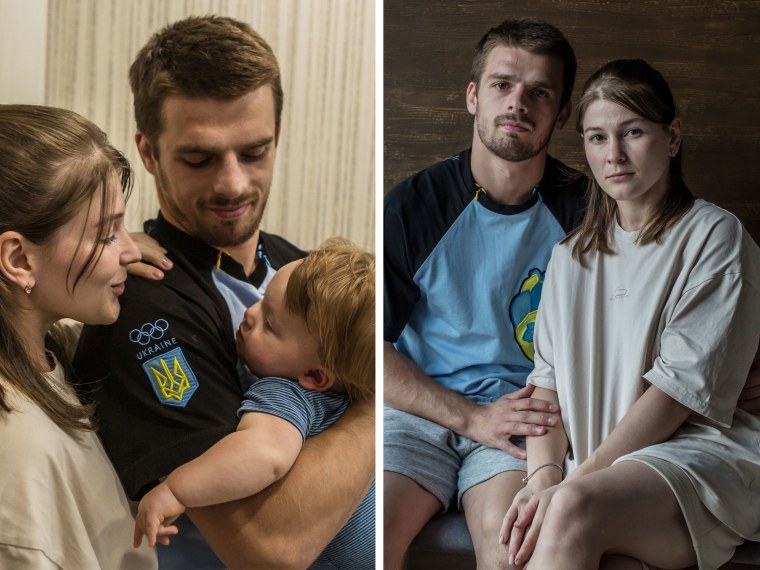
After Russian President Vladimir Putin launched his invasion in February 2022, Iadov said, none of his former friends from the Russian and Belarusian judo community sent him a message to check on him. “Not even a ‘How are you?’ Nothing.”
And his situation was made more complicated by the fact that his wife, Daria Bobrikova, was a Russian citizen from Bryansk, a city about 70 miles northeast of the Ukrainian border, and she was two months pregnant with their son Matviy when the war broke out.
A member of Russia’s judo team for eight years, Bobrikova, 29, was a two-time national champion, in 2014 and 2018. After meeting Iadov off the mat at a competition in 2019, she said, they fell in love and she moved to Ukraine the following year ahead of their wedding in Kyiv.
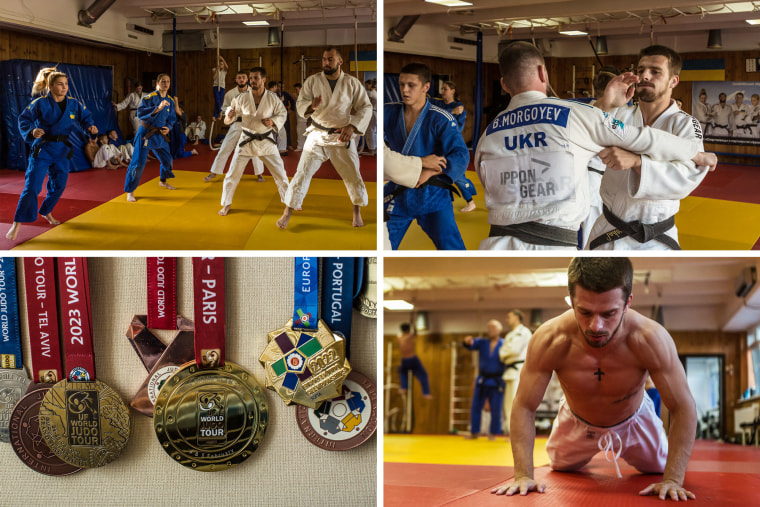
She said Russia disqualified her for three years for moving to another country, so she chose to end her judo career and start one as a portrait photographer. She added that she was currently trying to obtain Ukrainian citizenship.
While she still keeps in touch with her older sisters, Galya and Janna, 34 and 32, and the grandparents who raised them, Nadezhda and Nikolai, both 77, Bobrikova said they avoid conversations about the war. “It’s a sensitive subject,” she said.
“I don’t know when we will see each other again, and I am particularly sad about my grandmother, who is quite old,” she said, adding that she would not return to her homeland until the war was over.
When war broke out, Iadov said, he was training on the Spanish island of Tenerife, away from his pregnant wife who initially made the arduous journey to the western Ukrainian city of Uzhhorod near the border with Hungary on a packed evacuation train.
But in the end, shortly after Iadov won the European Championships in May 2022, they decided to return to the Ukrainian capital, despite offers for him to train abroad.
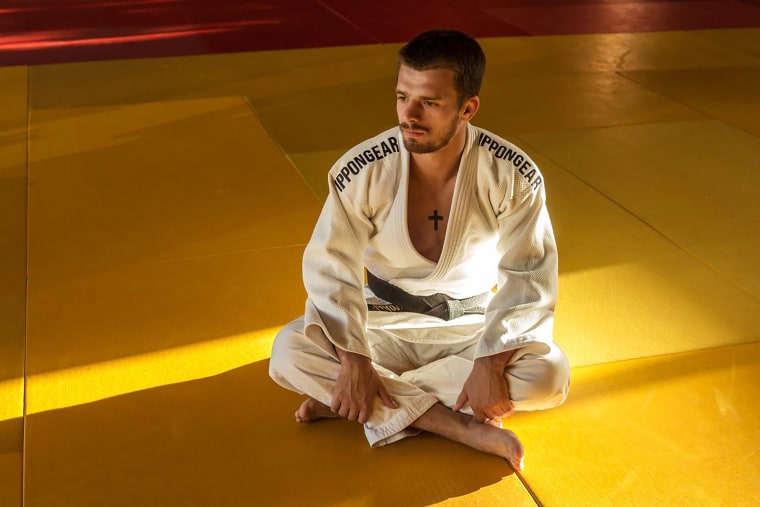
His training regimen is often disrupted by air-raid sirens, Iadov said, and travel for tournaments outside of the country has taken much longer because there are no civilian flights out of Ukraine, meaning he’s gotten less rest and practice time.
But the defiant Iadov said he would “stay in Ukraine always,” adding that if the situation got really bad his wife and son could leave. “Not me,” he said. “I will be here because it’s my country.”
Mahuchikh chose a different path, deciding weeks after the invasion, in early March 2022, to leave her mom and dad, Olha and Oleksiy Mahuchikh, and her sister Anastasiia Hryhorovich back in their home city of Dnipro in central Ukraine, which is near the front lines.
“When I said goodbye to my mother, father, sister, I didn’t know when I’ll see them again,” said Mahuchikh, who went on to win gold at the World Athletics Indoor Championships in Belgrade, Serbia, days later.
“All my motivation was to win the gold medal for our people, because it was really the start of the war and of a lot of bad news and I want to give my nationality happiness time, happiness news,” she said.
The decision was supported by her mom, Olha, 54, who, during a rare visit from her daughter in September, said she was happy that she was “safe abroad and that she doesn’t hear these explosions.” But “she worries about us,” Olha said.
Acknowledging the separation has been “the hardest thing,” her sister Anastasia, 31, added that she understood the sacrifice and that her sister’s victories brought “more attention to our situation.”
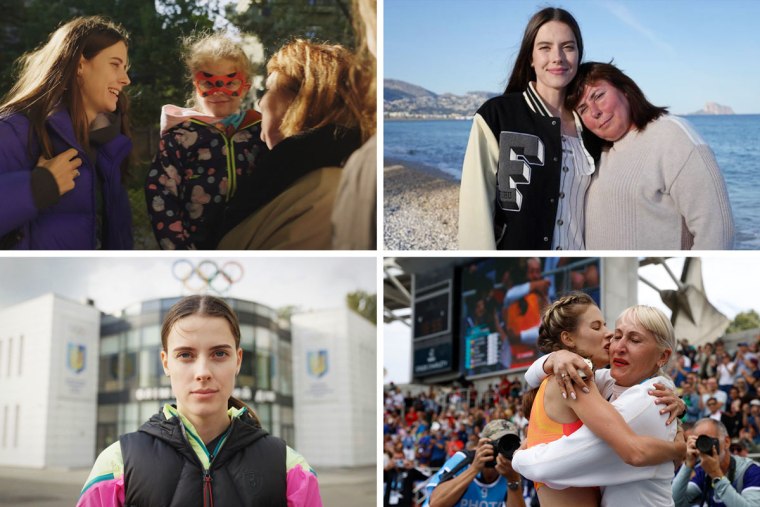
Now, Mahuchikh will head to Paris at the top of her game.
But she will be joined in the French capital by only another 139 Ukrainian athletes, Vadym Gutzeit, the president of the country’s Olympic committee, said Tuesday. Ukraine’s sports ministry told NBC News it will be the smallest number since 1996, when Ukraine started taking part in the Summer Olympics.
Although only 16 Russian and 16 Belarusian athletes have accepted invitations to compete in Paris, according to the latest tally on the IOC website, there is a chance Mahuchikh could brush shoulders with them, although they are not competing in any track-and-field events.
It’s a similar story for Iadov, who will not have to face a Russian rival after the Russian Judo Federation withdrew 12 judokas from the Games, claiming in a statement earlier this month that the International Olympic Committee’s decision to let only four of them compete was “humiliating.”
“If I am honest, it did not arouse any emotions in me,” Iadov said. “I try to focus on myself and my results and not think about anything else.”
Wearing her trademark blue-and-yellow eyeliner, Ukrainian high jumper Yaroslava Mahuchikh smashed a 37-year-old high jump world record earlier this week.
The world and European champion is now hoping for gold at the 2024 Paris Olympics, where she said she would be honored to represent her country’s soldiers battling Russian forces on the front lines.
“It’s only because they protect us I have the opportunity to jump,” Mahuchikh, 22, said in one of several interviews she gave to NBC News between last September and April. She added that she took inspiration from letters she’d received from some of the troops.

Like many of her fellow Ukrainian athletes, Mahuchikh was angry that some Russian and Belarusian athletes would be allowed to attend the Games after the International Olympic Committee cleared some of them to compete under neutral status, without a national flag or anthem.
“If you talk about the Olympic Games, it’s about peace. How can we talk about peace if Russia invades my country in the center of Europe? It’s crazy,” she said. “When I see Russian athletes, I imagine every city, every building destroyed, every life that Russia takes,” she added.
Those views were echoed by Bogdan Iadov, a judoka who, like Mahuchikh, is one of Ukraine’s medal hopes in Paris. “When the war continues, they can’t participate,” said Iadov, 27, who also gave several interviews to NBC News in recent months.

After Russian President Vladimir Putin launched his invasion in February 2022, Iadov said, none of his former friends from the Russian and Belarusian judo community sent him a message to check on him. “Not even a ‘How are you?’ Nothing.”
And his situation was made more complicated by the fact that his wife, Daria Bobrikova, was a Russian citizen from Bryansk, a city about 70 miles northeast of the Ukrainian border, and she was two months pregnant with their son Matviy when the war broke out.
A member of Russia’s judo team for eight years, Bobrikova, 29, was a two-time national champion, in 2014 and 2018. After meeting Iadov off the mat at a competition in 2019, she said, they fell in love and she moved to Ukraine the following year ahead of their wedding in Kyiv.

She said Russia disqualified her for three years for moving to another country, so she chose to end her judo career and start one as a portrait photographer. She added that she was currently trying to obtain Ukrainian citizenship.
While she still keeps in touch with her older sisters, Galya and Janna, 34 and 32, and the grandparents who raised them, Nadezhda and Nikolai, both 77, Bobrikova said they avoid conversations about the war. “It’s a sensitive subject,” she said.
“I don’t know when we will see each other again, and I am particularly sad about my grandmother, who is quite old,” she said, adding that she would not return to her homeland until the war was over.
When war broke out, Iadov said, he was training on the Spanish island of Tenerife, away from his pregnant wife who initially made the arduous journey to the western Ukrainian city of Uzhhorod near the border with Hungary on a packed evacuation train.
But in the end, shortly after Iadov won the European Championships in May 2022, they decided to return to the Ukrainian capital, despite offers for him to train abroad.

His training regimen is often disrupted by air-raid sirens, Iadov said, and travel for tournaments outside of the country has taken much longer because there are no civilian flights out of Ukraine, meaning he’s gotten less rest and practice time.
But the defiant Iadov said he would “stay in Ukraine always,” adding that if the situation got really bad his wife and son could leave. “Not me,” he said. “I will be here because it’s my country.”
Mahuchikh chose a different path, deciding weeks after the invasion, in early March 2022, to leave her mom and dad, Olha and Oleksiy Mahuchikh, and her sister Anastasiia Hryhorovich back in their home city of Dnipro in central Ukraine, which is near the front lines.
“When I said goodbye to my mother, father, sister, I didn’t know when I’ll see them again,” said Mahuchikh, who went on to win gold at the World Athletics Indoor Championships in Belgrade, Serbia, days later.
“All my motivation was to win the gold medal for our people, because it was really the start of the war and of a lot of bad news and I want to give my nationality happiness time, happiness news,” she said.
The decision was supported by her mom, Olha, 54, who, during a rare visit from her daughter in September, said she was happy that she was “safe abroad and that she doesn’t hear these explosions.” But “she worries about us,” Olha said.
Acknowledging the separation has been “the hardest thing,” her sister Anastasia, 31, added that she understood the sacrifice and that her sister’s victories brought “more attention to our situation.”

Now, Mahuchikh will head to Paris at the top of her game.
But she will be joined in the French capital by only another 139 Ukrainian athletes, Vadym Gutzeit, the president of the country’s Olympic committee, said Tuesday. Ukraine’s sports ministry told NBC News it will be the smallest number since 1996, when Ukraine started taking part in the Summer Olympics.
Although only 16 Russian and 16 Belarusian athletes have accepted invitations to compete in Paris, according to the latest tally on the IOC website, there is a chance Mahuchikh could brush shoulders with them, although they are not competing in any track-and-field events.
It’s a similar story for Iadov, who will not have to face a Russian rival after the Russian Judo Federation withdrew 12 judokas from the Games, claiming in a statement earlier this month that the International Olympic Committee’s decision to let only four of them compete was “humiliating.”
“If I am honest, it did not arouse any emotions in me,” Iadov said. “I try to focus on myself and my results and not think about anything else.”



